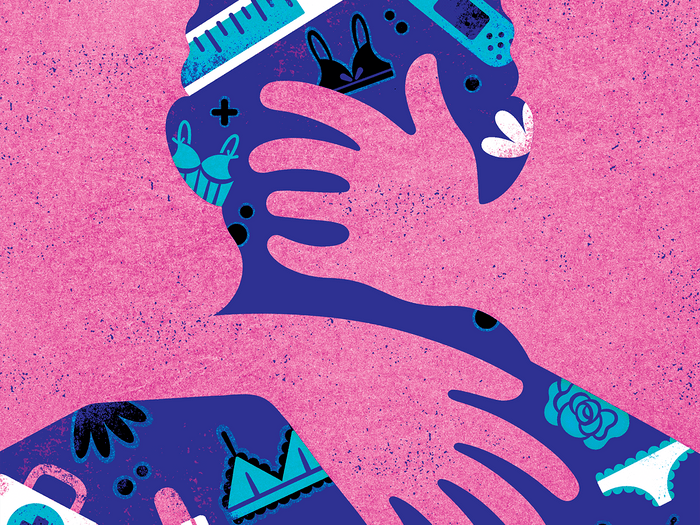Why I’m Getting the HPV Vaccine as a 47-Year-Old Mom of Three

A suddenly steamy sex life has a lot to do with it.
At my last visit to the family doctor, my GP high-fived me after I confessed why I was there. I needed birth control, as a 47-year-old divorced mom of three who’s finally dating again—and having the best sex of my life, I might add.
My new guy is nine years younger than me, and I’m having the hottest sex since my early 20s. (And maybe ever? To be honest.) It’s such a delight, to say the least, especially because, after my marriage ended, I had surrendered to the fact that maybe this chapter of my life was, if not completely over, going to be a lot less, well, energetic. I am so, so glad to be wrong.
But it’s not just what happens between the sheets—my new paramour is young, smart, fun and makes me feel like the sexiest woman in the world. (I seriously suggest lowering your age range on dating apps. Younger men love older women, it seems.)
Last week we were supposed to go out for dinner for my birthday, so I dressed up and headed over to meet him at his place. Within minutes of me knocking on his door, my clothing was in a pile on his living room floor. We never made it to the restaurant—instead, we spent six hours in bed, breaking only for him to make me dinner. It was heaven.
So this is why I decided to go back on birth control for the first time in a decade. My new boy toy (boyfriend? partner? I have no idea what to call him, but it sure is fun) and I also agreed to get tested for STIs.
I love my family doctor, and he’s a genuinely wonderful person, yet I was still a bundle of nerves as I walked into his office. He has guided me and my family through life’s momentous milestones, like the birth of my children, as well as through minor and decidedly unglamorous complaints, from Pap smears to burning plantar warts on my kids’ feet. He also helped me through the follow-up when I found a lump in my left boob, which was terrifying. (Thankfully, it went away of its own accord.) It’s fair to say he knows me intimately. But I was somehow still embarrassed to admit to him that I was—at last—getting some.
“Why are you nervous?” he asked. “You’re not old or dead—I’m happy for you. You deserve this.”
I welled up. I’ve been legally separated for more than three years, and while I’ve had a few flings, this is the first time since my marriage ended that I’ve felt this close to someone. It meant a lot to hear that I deserved it.
He wrote a prescription for birth control and, to test for the most common STIs, he sent me home with a vaginal swab I could drop off later at my local hospital. “There’s something else I want you to do, though,” he said. “I want you to get the Gardasil vaccine.”
Gardasil prevents infections from HPV (human papillomavirus), a sexually transmitted viral infection that can cause skin or mucous membrane growths such as warts. Some of them can become anal and genital cancers, such as cervical cancer. (HPV can also cause ovarian, vulvar, penis, oral and throat cancers.) The Gardasil vaccine has been routinely given to Canadian girls between the ages of nine and 13 since 2007. By 2010, the vaccine program was expanded to both sexes, and it has been largely successful. In 2021, Statistics Canada placed the national HPV vaccination rate for children aged 14 at 84 percent.
My 16-year-old had Gardasil shots while they were in middle school, but it is not generally offered to older women, and is, in fact, only recommended to women aged 45 and under because that is the group that the vaccine has been most widely tested on. The National Advisory Committee on Immunization (NACI) stays a bit vague in their recommendations, saying that the vaccine “may” be given “to women 26 years of age and older at ongoing risk of exposure to HPV.” This means there’s nothing saying we shouldn’t get it, and NACI does list benefits for older women. It’s just not something we are going to be offered for free. This, says Halifax OB/GYN James Bentley, is because the vaccine is expensive, and the number of women at risk of a later-in-life exposure to HPV isn’t high enough to justify the cost of offering it free for everyone.
My doctor told me he had recently attended a medical conference where an oncologist friend advised him to catch all the 40-something divorcees coming into his office and recommend that they have Gardasil shots to help them avoid HPV-related cancers—it’s not too late for the vaccine to make a difference.
Interestingly, after my doctor appointment, I mentioned the vaccine to a pharmacist friend, and he confirmed that he’s started to see more older women being prescribed the vaccine.
Based on the most recent available statistics, which are from 2022, the Canadian Cancer Society estimates that 1,450 Canadian women are diagnosed with cervical cancer each year, and 380 will die from it. But the vaccine can stop you from getting HPV, and, if you already have HPV, stop it from morphing into cancer.
Because I want cancer about as much as I want a fourth baby at age 47, I said yes, and booked the first of three vaccines—spread two months apart—at my local pharmacy, even though it would be an out-of-pocket cost for me.
I also wanted to know more about the vaccine’s efficacy for women in their 40s, especially because I was getting mixed messages from everything I read. The Canadian guidelines for girls and women explain that while peak risk for HPV infection is within five to 10 years of the first sexual experience, there’s often a second peak in HPV prevalence observed in women 45 years and older.
Meanwhile, the U.S. Centers for Disease Control (CDC) and their Advisory Committee on Immunization Practices (ACIP) do not recommend the vaccine for women my age. (The CDC guidelines say that the vaccine provides less benefit later in life for several reasons, “including that more people in this age range have already been exposed to HPV.”)
I asked Bentley, the Halifax OB/GYN, for more information on this—he’s also a Dalhousie University professor of gynaecologic oncology, and he conducts research into cervical cancer and HPV vaccines.
“There haven’t been large trials carried out on women aged 45-plus who’ve had Gardasil, but the small trials did show less abnormal (pre-cancerous) cervical cells—and fewer abnormal Pap smear tests—in the vaccinated group compared to the unvaccinated group,” he told me. “And, even if you have been infected with a strain of HPV before getting the Gardasil vaccine, it may still reduce the likelihood of those precancerous cells forming.”
This is important, because the time period from HPV infection to developing cancer, or finding precancerous cells, can be up to 15 to 20 years, for those with typical immune systems. You can be completely asymptomatic for years, with no clue that you are infected.
One thing that really struck me from my conversation with Bentley was his comment that personally, in the last decade or so, he’s seen markedly fewer cases of anal or genital warts in women younger than 30. He credits the high uptake of the Gardasil vaccine as the reason why.
A research review published in the American Journal of Sexually Transmitted Diseases in 2019 reported “consistent declines in females age 25 years and younger after 2006, when routine female vaccination began in the United States.”
“Before the Gardasil vaccine I was seeing one [case] a week in my practice,” says Bentley. “While I doubt anal and genital warts will be eradicated by the end of my career, they are definitely less problematic [than they used to be]. And we are seeing less and less cervical cancer as time goes on. The group that I’m seeing abnormal cells in is getting [older], because just about everybody under 30 has been vaccinated.”
So why aren’t more women over the age of 45 rushing to get the Gardasil vaccine? I’m guessing it’s a lack of awareness and not enough vaccine outreach. If I hadn’t gotten divorced, started dating again, and gone to my doctor for birth control, I would have no idea that Gardasil was something I should pursue.
That said, I don’t think that married women (or men) should assume that they are protected against contracting HPV. Plenty of people step out on their long-term partners, and I have several friends who only found out their husband was having an affair because they contracted an STI.
For those who are feeling any vaccine hesitation, Bentley notes that HPV vaccination is not likely to cause any harm.
“There is a definite benefit to being vaccinated against HPV. The biggest harm it causes is financial, because this is an expensive vaccination that isn’t covered by Health Canada for adults, though many drug plans do cover it,” he says. “The reality is that people have to make a judgment call about whether they can afford this, and I don’t want anyone to feel guilty if they can’t.”
While $600 to $700 total is a hefty price tag—especially as a single mom whose drug plan did not cover it—getting the series of three shots, at more than $200 each, was still a no-brainer. My life is stressful enough, so I want to protect myself and make sure that when I’m in bed with my new guy, there’s nothing to think about other than having a rollicking good time. I’m also happy to report that for me, the first shot was no more painful than my COVID shots were, with no side effects, and there was no significant tenderness or numbness around the injection site afterward.
Bentley says that the number-one message he wants to spread among 40-something women who are having sex with new partners is that we need to be screened for cervical cancers—whether we’re vaccinated or not. Currently, each province has different guidelines on how often women should get Pap smears, ranging from every year to every two or three years, depending on medical history. So, book yourself in for a screening, and if you haven’t had an HPV vaccine, talk to your healthcare provider about whether this is a good option for you.
Next: I’m One of the 1/7 Canadians with Genital Herpes—Here’s What You Need to Know




